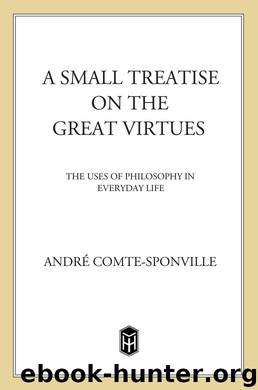A Small Treatise on the Great Virtues by André Comte-Sponville

Author:André Comte-Sponville
Language: eng
Format: epub
Publisher: Henry Holt and Co.
Published: 2011-05-08T16:00:00+00:00
Let me sum up. To be pure is to be unadulterated, which is why purity does not exist and is not human. The impure within us is not absolute, or definitive, or equal; to know that we are impure presupposes, at the very least, a certain idea or ideal of purity, an ideal of which art sometimes makes us aware (think of Dinu Lipatti’s renditions of Mozart or Bach, certain paintings by Vermeer, or poems by Eluard) and that we ourselves sometimes approach in our own lives (in our love for our children, for our friends, for close ones who have died). This purity is not an eternal essence; it results from a process of purification—Freud would say of sublimation—whereby love comes into being by freeing itself from itself: the body is the crucible, desire is the flame (which “consumes everything that is not pure gold,” says Fénelon), and what remains—if anything remains at all—is sometimes “an act of pure and entirely selfless love,” liberated, as Fénelon says, from all hope as well.23 Purity is not a thing or even a property of the real; it is a certain modality of love—or it is nothing at all.
A virtue? No doubt, or that which allows love to be one and to take the place of all the others. One must therefore not confuse purity with continence, prudery, or chastity. Purity exists whenever love ceases to be “mixed with self-interest,”24 or rather—since purity is never absolute—only insofar as love displays disinterestedness: truth, justice, and beauty can be loved purely, as can—why not?—that man or that woman present before you who gives of himself or herself and whose existence (far more than his or her possession) is enough for you. Purity is love without covetousness.25 We love in this way the beauty of a landscape, the fragility of a child, the solitude of a friend, and, sometimes, the man or the woman that our entire bodies covet nonetheless. There is no absolute purity, but there is also no complete or definitive impurity. It can happen that love, pleasure, or joy frees us from ourselves, from our own avidity and egoism; it is even possible for love to purify love (it seems to us we have experienced or sensed as much), to the point where the subject gets lost and flees, when there is nothing but joy, when there is nothing but love (love “freed from all belonging,” as Christian Bobin puts it)—when there is nothing but everything and the purity of everything. “Blessedness,” writes Spinoza, “is not the reward of virtue, but virtue itself; nor do we enjoy it because we restrain our lusts; on the contrary, because we enjoy it, we are able to restrain them.”26 This is the last proposition in The Ethics, which shows how great the path is that separates us from what those words describe.
But though the path may be filled with turpitude, to the pure gaze it is already pure.
Download
This site does not store any files on its server. We only index and link to content provided by other sites. Please contact the content providers to delete copyright contents if any and email us, we'll remove relevant links or contents immediately.
Tuesdays with Morrie by Mitch Albom(4783)
Adulting by Kelly Williams Brown(4574)
Pillow Thoughts by Courtney Peppernell(4283)
The Book of Joy by Dalai Lama(3986)
A Woman Makes a Plan by Maye Musk(3253)
The Boy, the Mole, the Fox and the Horse by Charlie Mackesy(3126)
Tuesdays With Morrie by Mitch Albom(2761)
The Alchemist by Paulo Coelho(2694)
A New Earth: Awakening to Your Life's Purpose by Eckhart Tolle(2652)
The Four Agreements: A Practical Guide to Personal Freedom (A Toltec Wisdom Book) by Ruiz Don Miguel(2485)
The Charisma Myth: How Anyone Can Master the Art and Science of Personal Magnetism by Cabane Olivia Fox(2446)
Untamed by Glennon Doyle(2348)
Why Is God Laughing?: The Path to Joy and Spiritual Optimism by Deepak Chopra(2277)
Manson, Mark - The Subtle Art of Not Giving a F*ck by Manson Mark(1992)
Tiny Habits by BJ Fogg(1979)
The Happiness Advantage: The Seven Principles of Positive Psychology That Fuel Success and Performance at Work by Shawn Achor(1829)
Warrior of the Light by Paulo Coelho(1758)
The Boy, The Mole, The Fox and The Horse by Mackesy Charlie(1710)
Think and Grow Rich! by Napoleon Hill(1669)
